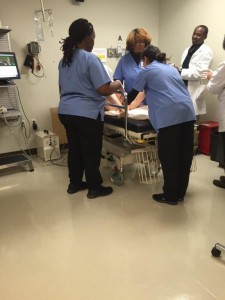
Ivonne Loya’s first day in El Centro College’s make-shift hospital room involved an oversized, pregnant mannequin that had difficulty breathing and a problem delivery.
The first-year nursing student paced her own breathing as she coached the simulated patient through a succession of checks: “How is your breathing? Are you in pain,” Loya asked of the patient, who responded with faint cries that grew louder with each query.
“Okay. Take a deep breath. Put the patient flat on the table. Put her leg up. The baby is really big,” said Eric Smith, the lab and simulation coordinator for El Centro’s nursing program. He instructs students as they work on lifelike dolls and offers feedback that forces them to think critically and carefully about what they have learned in class.
“Students train with realistic mannequins that mimic health symptoms and maladies. The life-sized dolls can mimic a pulse, allow tracheotomies, generate blood pressure readings or handle needle insertions,” Smith said.
And, for students like Loya, there is a baby mannequin which is about to be delivered.
“These students are thrown into situations they are likely to experience when they begin working in hospitals, nursing homes or schools. The idea is to practice what they’ve learned in the classroom,” Smith said.
“Anything can happen in a normal delivery,” Smith said about the state-of the-art simulations. “We can have breached birth or anything. We have to prepare them for all kinds of situations.”
These simulators mimic real-life clinical settings. Mistakes are common – even encouraged – because they help students learn. “The students become more confident as they proceed,” Smith added.
Second-level students like Richard Boachie have spent time working in hospitals. The simulations, he said, are constant reminders of actual medical procedures. “Nothing is routine,” Boachie said. “In simulating the birth of the baby, you have to know what to expect.”
The scenarios or simulation exercises build mental toughness. The students can think through a situation as they consider best practices, said Joan Becker, dean of the nursing and ADN program at El Centro. In addition to births, students work with mannequins that are having heart attacks or suffering from burns or a host of other maladies.
“These mannequins respond to questions,” Becker said. “If you give the wrong medication, the mannequin will follow that path and could die. But that’s fine because our students are allowed to take risks in a testing environment. It’s how you learn.”
With nursing programs at three of its seven colleges, DCCCD supplies more nurses to Dallas hospitals than any other school in the county, according to Ben Magill, the district’s director of workforce and economic development.
Nursing is available at El Centro (which graduates North Lake students), Mountain View and Brookhaven colleges. The nursing program is different from most because success is all but guaranteed to those who do the work and pass their classes, Becker said.
DCCCD graduates 1,200 students a year who are trained and ready to fill slots in a field that can never meet the demand. Dallas, like most major cities, is facing a critical nursing shortage. And DCCCD students pass their courses at a rate of 95 percent, officials said.
Students can prepare for vocational nursing careers in 12 months. A graduate with an associate degree in nursing could become a registered nurse in 24 months, compared to four years for some RN programs.
Nurses educate the public about various health conditions. Typically, they work in hospitals, doctor’s offices, nursing homes, schools, correctional institutions and serve in the military, said Dr. Shannon Ydoyaga, who heads the district’s Health Careers Resource Center.
With help from Helix, a job bank program that connects students with healthcare employers, DCCCD students can explore career options.
“Because we face skills gaps in the workforce across the United States, collective impact solutions are essential from an economic standpoint to help move students through the pipeline faster to meet the needs of growing industries,” Ydoyaga said.
Students, she said, are trained on cutting-edge technology. “This approach is critical in areas where students meet industry shortages and begin working at a high level of performance,” Ydoyaga said. “We do a lot of the grow-your-own.”
After graduating, nurses can write their own ticket. They are hired in diverse fields including radiology, respiratory care, labor and delivery, and surgery, Ydoyaga said.
Median pay for Licensed Vocational Nurses is $42,490 per year, according to the U.S. Department of Labor. The projected outlook in 2024 is 16 percent, faster than most careers.
Registered nurses boast of a median annual wage of $66,640, and employment is projected to grow 16 percent – much faster than the average for all occupations, according to the Labor Department.
DCCCD also trains certified nurse aides to become patient care technicians with six months of training. That increases their marketability from an average of $10.38 hourly to $14.91 an hour, Ydoyaga said.
“How do we make our community move out of poverty and into a livable wage?” Ydoyaga asked. “We need dental hygienists and radiologists and pharmacy techs. We work with high schools and try to educate them about career paths. Our area is a resource for the college industry and our students. We are a hub for health care.”
DCCCD students receive clinical care training at area hospitals, including Brentwood Healthcare, Dallas Regional Medical Center, Methodist Charlton Medical Center, Methodist Health System, Texas Scottish Rite Hospital for Children and Dallas Veterans Affairs Medical Center.
In addition to degree programs, 200 credit and continuing education programs are offered in the medical field with training that makes those students “job ready.” And DCCCD is engaged in partnerships with workforce centers, industries and private entities. “We do intensive advising. DCCCD is high quality and affordable,” Ydoyaga said.
For more information, visit dcccd.edu/nursing.




